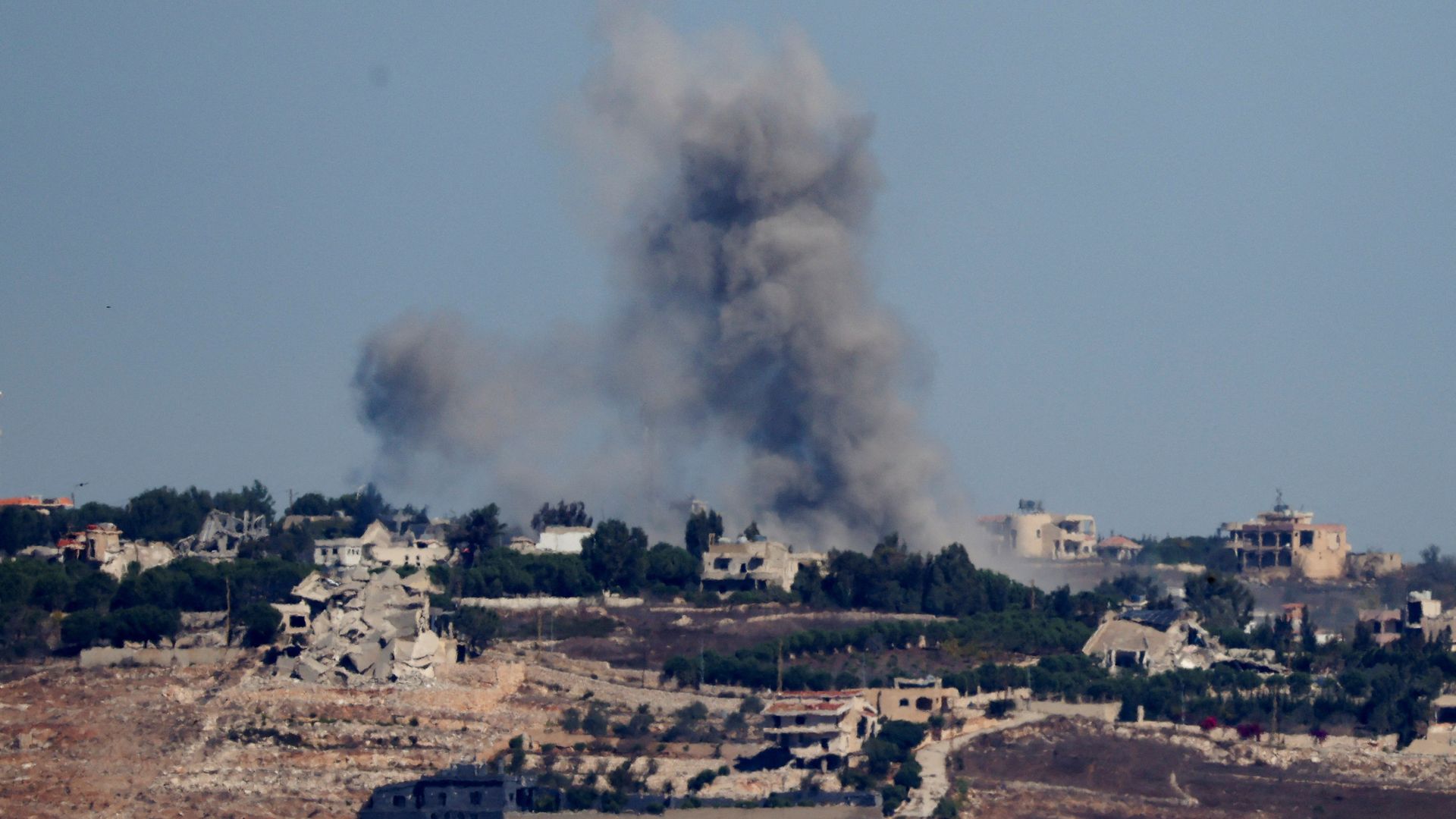The mass of Israeli tanks and armoured personnel carriers was impossible to hide.
Dozens of beige-coloured military vehicles had amassed in a dirt field in northern Israel, a few miles away from the border with Lebanon.
Follow latest: Frontrunner to replace Hezbollah leader ‘unreachable’ – reports
They appeared overnight earlier in the week but were gone the next day.
The only evidence of their presence was a few crates of empty ammunition cases and tank tracks in the soil.
It was unclear where the unit disappeared to but, with hundreds of rockets fired by Hezbollah into this part of the country in the past three days alone, it is unsafe to stay in the same location for long – whether or not the heavy armour was bound for southern Lebanon.
Later in the day, we drove closer to the border. It was possible to see Lebanese homes on the hilly terrain on one side and Israeli houses on the other – communities combined by geography but divided by war.
A year in captivity: Faces of 97 hostages who still haven’t returned home to Israel
Israel-Hamas war: A timeline of events in the year since 7 October – amid fears of wider Middle East conflict
Ayatollah Ali Khamenei: Who is Iran’s supreme leader and how powerful is he?
As we stood a few hundred metres away from the border, the sound of distant gunfire could be heard as Israeli ground troops battled against Hezbollah inside Lebanon.
There was also the boom of artillery rounds and the buzz of a drone overhead.
Blackened scorch marks scarred the ground around us – likely caused by some of the many Hezbollah rocket strikes in recent days.
The militant group – backed by Iran – began firing munitions into northern Israel the day after the 7 October atrocities in southern Israel by Hamas, which is also aligned with Tehran.
Since that moment, some 60,000 civilians have fled towns, villages and kibbutzim close to the border.
Please use Chrome browser for a more accessible video player
Enabling all these families to return is a key goal of the widened Israeli operation against Hezbollah, which began last month and expanded into a ground offence in the past few days.
We travelled to Kibbutz Dan, just over a mile from the border. Famous for trout farming, this used to be a vibrant community of around 700 people, including children who would race around on bikes or play in a large swimming pool.
Today, there are only about 150 residents left. Among them are Shaul and Bilha Givoni, aged 80 and 79 respectively.
He has lived in the kibbutz his whole life, including during the 1948 war that followed Israel’s establishment as a sovereign state.
At that time, as a child, he had been forced to evacuate.
“After that, I said – this is my home, no one will ever evacuate me again,” Shaul said.
Read more from Sky News:
40 ambulances ‘destroyed’, Lebanese emergency workers say
The 97 hostages who haven’t returned home to Israel
Netanyahu: Israel’s longest-serving leader
He and his wife showed me their lovingly-decorated one-storey home, built next to an orchard, where pomegranate trees were heavy with fruit.
Lucky charms hung on the outside wall of the front of the house, as well as an ornament made out of a chunk of metal from Israel’s air defence system and a display on a shelf made from shrapnel from an incoming Hezbollah rocket.
As we spoke, the distant booms of war could be heard. Bilha admitted that she found it scary. “Fear, fear, fear – it’s a lot of fear. Fear affects our health, our psyche, our thoughts.”
Her husband then interrupted to say: “I’m not afraid.” His wife responded: “That’s why I sit close to Shaul, I can rely on him.”
Pointing to her head and then to her heart, she said: “Shaul works from here [his head] and I work from here [my heart]. We’ve been married since 1969, and together since 1965.”
Keep up with all the latest news from the UK and around the world by following Sky News
Shaul said he supports Israel’s offensive against Hezbollah inside Lebanon, but he and his wife doubt whether it will result in all of the families who fled northern Israel to return – which is one of the stated goals of the Israeli prime minister.
“Home is home, but when one is afraid you can’t force the fear out of him,” said Bilha.
Be the first to get Breaking News
Install the Sky News app for free
“That’s what happened to many people here – even with the discomfort of being evacuated – they are dominated by fear.”
Her husband added: “I believe that some people won’t return – because of fear but also because it’s already been a year, people have moved on, found new schools for their children. Why should they return to all this mess?”
A day after we visited the couple, they told us that a Hezbollah rocket crashed into the ground close to their home – shattering the peace, but not their resolve to stand firm.










